We recently connected with David Emmanuelle Castillo and have shared our conversation below.
David Emmanuelle, thanks for taking the time to share your stories with us today Along with taking care of clients, taking care of our team is one of the most important things we can do as leaders. Looking back on your journey, did you have a boss that was really great? Maybe you can tell us about that boss and what made them a wonderful person to work for?
To be totally transparent, this person may probably be bothered that they came to mind when a question was posed with the word “boss” in it. However, LaNelle Ramey is a total boss, and I mean that in the Jay-Z 2nd verse of “Boss” type of boss. Like myself, LaNelle was part of the founding team of the Department of Black and Latino Male Achievement (BLMA) for Milwaukee Public Schools. He initially served as our External Director and eventually became the sole director due to austerity measures. His style of leadership was like nothing I had ever seen before.
I was so used to seeing people who were in a boss-like role carry that title in a very egotistical manner, relying on the authority a hierarchy or positionality entailed for them to get others to essentially do whatever it is they wanted them to do. From my experience, bosses who move in this way often lack mission and vision since everything is self-serving. That definitely was not LaNelle. He believed and embodied shared and servant leadership. He involved every member of BLMA in shaping our mission, vision, strategic plan, and the tactics we would employ to accomplish goals set. He also had a great eye for identifying skill sets that members within the team probably didn’t even think they had, and I can speak for myself on this piece. In our second year he gave a team member and I a responsibility that involved a great degree of coordination as well as communications and marketing. I was really hesitant, pushed back even, and I still recall his response, “I gave you this task because I believe you can do it. Not going to lie to you family, it is going to push you out of your comfort zone, but I know you can do it and will grow because of this. Do you?” That whole statement did something to me psychologically, especially with the smoothness in which he said it and how he closed it out. He saw something in me I didn’t see in myself, and I am grateful because I experienced a lot of growth because of it.
LaNelle was also a man of the young people we served in our program. He took time to get to know all the boys that were being served by BLMA, and to this day has maintained relationships with them, doing whatever it is he can do within his sphere of influence to mentor and provide them access to opportunities and resources. In a world where I see adults flex their power and hoard access to resources and opportunities, people like LaNelle are truly a unicorn. He is the type of leader I aspire to be when interacting with other adults and young people.
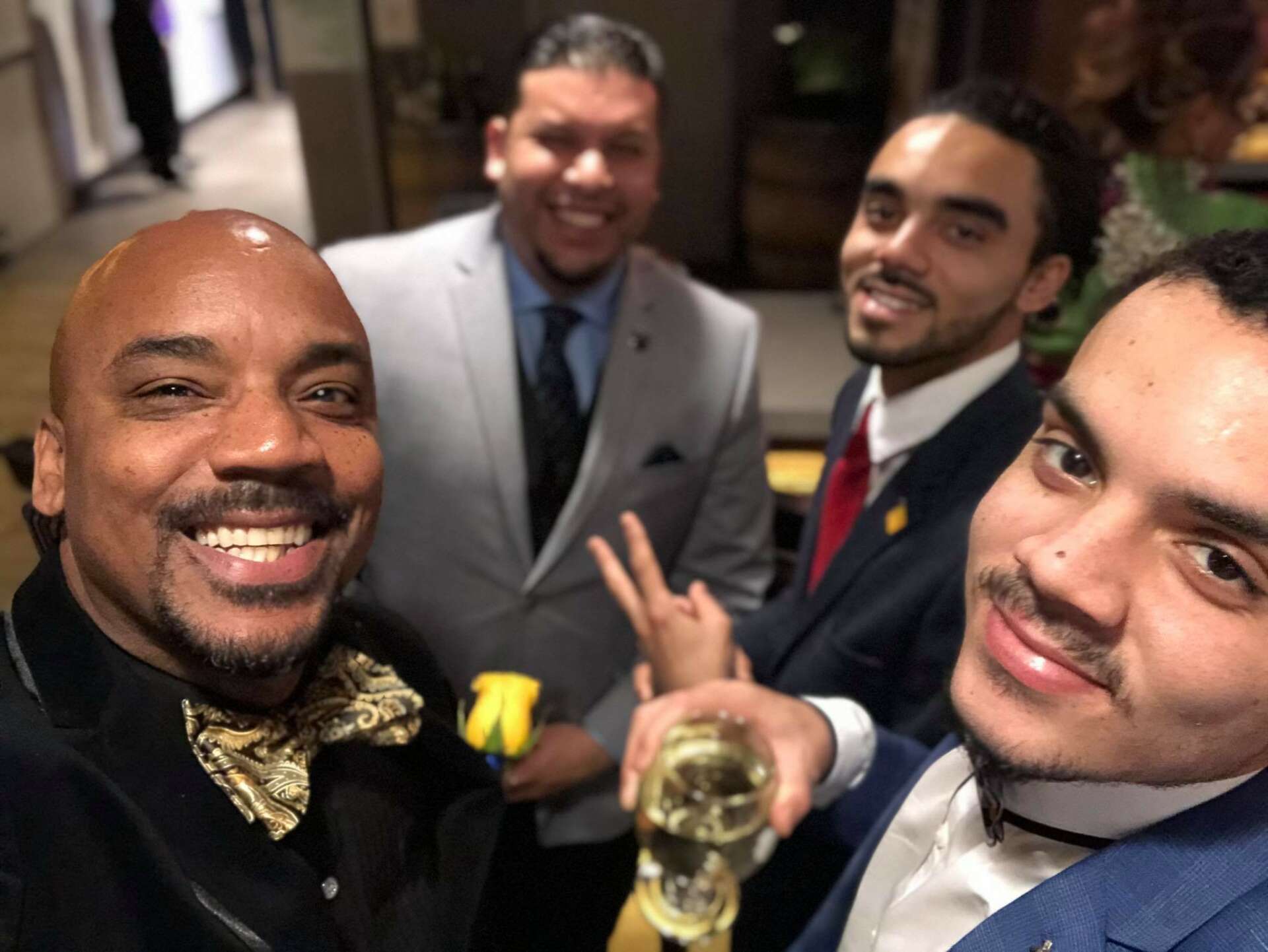
Great, appreciate you sharing that with us. Before we ask you to share more of your insights, can you take a moment to introduce yourself and how you got to where you are today to our readers.
Starting Equitable Systems Consultants was rooted in my disillusionment with systems, especially the educational system since that was the one I gained professional experience in. The pandemic plus the social unrest and the inadequate responses I saw from the school system put me in a state of what I like to call healthy pessimism. I was early on in my healing journey at the time, and since I felt so displeased with humanity and our societal response to people living life on the margins and on the margins of the margins, I protected my mental health through group and individual therapy, my Chrisitan faith, books, and the application of theory. I am extremely proud of myself because I know in the past I’ve often chosen unhealthy coping mechanisms that got me even further lost in the sauce. Getting lost in the things that were part of healthy/proactive coping, especially reading and connecting with certain people around content I read, renewed two things. My faith in myself to be an agent of transformative social change and my faith in humanity.
It was during this time that I started to read about abolitionist doctrine. Given what I was reading and unpacking, I came to realize that the first recorded abolitionist in history was Jesus Christ, recognizing we’ve been programmed to not view The Almighty in that way. I also started to wonder how it was that this prophet of love, justice, and transformative social change became a symbol of hate and maintenance of the status quo.
I guess you can say there is a reason why 1 Samuel 16:7 says that the Lord does not look at the outward appearance of man, but at man’s heart. This was a time where I engaged in the practice of ninoyolnonotza, the Nahuatl word which transliterates to “I address myself to my heart.” I really wanted to look at matters of the heart and turn my disillusionment into creativity and love. Numerous texts were crucial in this, but three that had an integral role were Healing Resistance: A Radically Different Response to Harm by Kazu Haga, The Fire Next Time by James Baldwin, and Where Do We Go From Here: Chaos or Community? by Dr. Martin Luther King Jr.
Haga’s commentary on the three levels and four types of conflict, intergenerational trauma, and Kingian non-violence has to create a more equitable and just world, hit my soul. Baldwin’s words of “I imagine one of the reasons people cling to their hate so stubbornly is because they sense, once hate is gone, they will be forced to deal with pain” inspired me to sit with the discomfort that comes with healing, recognizing making space for my pain was also making space for radical self-love and love for humanity. Reading Dr. King’s text shortly thereafter and encountering the quote of, “Returning hate for hate multiplies hate, adding deeper darkness to a night already devoid of stars. Darkness cannot drive out darkness; only light can do that. Hate cannot drive out hate, only love can do that,” helped make everything I was processing all the more sense. Spreading love is truly a revolutionary act in a world filled with so much hate. This, among other things, inspired the creation of my business.
The mission of Equitable Systems Consultants is to create the next generation of systems thinkers through servant leadership and The Five C’s of Critical Care (Rolón-Dow, 2005), Critical Faith (Lee & Givens, 2015), Critical Hope (Andrade, 2009), Critical Love (Sealey-Ruiz, 2020), and Critical Reflection (Howard, 2003). Our vision seeks to develop systems thinkers across all social determinants of health, making possible the ability to create healthy, thriving ecosystems rooted in evidence-based practices and informed-decision making. The Five C’s required reading a great amount of scholarship for operationally defining what each C meant (see below).
Critical Care (Rolón-Dow, 2005): Humanizing the people we serve by treating them with full-inherent human dignity (Irby & Liston, 2017) while also recognizing the ways whiteness and patriarchy make this standard of care an anomaly.
Critical Faith (Lee & Givens, 2015): Embodying Christ-like behavior (Hirsch, 2010) through compassion by centering dialogue, competence by centering contextualization, and commitment by centering praxis (Freire, 1970; Lee, 2007).
Critical Hope (Andrade, 2009): Centering dialogue, contextualization and praxis based in authentic (Valenzuela, 1999) and critical care, while acknowledging the ways the cocoon of whiteness and patriarchy prevents the caterpillar from actualizing its transformation into a butterfly (Lamar, 2015).
Critical Love (Sealey-Ruiz, 2020): Strong, moral disposition of authentic and critical care by humanizing and overriding erasure (Brooks, 2017) to implement the demands of justice (King, 1967).
Critical Reflection (Howard, 2003): The ability to engage in cognitive dissonance of one’s beliefs and socialization processes while demonstrating critical consciousness (Ladson-Billings, 1995) of the ways cultural hegemony (Gramsci, 1992) leads to color-blindness, deficit-thinking and poverty disciplining (Fergus, 2017).
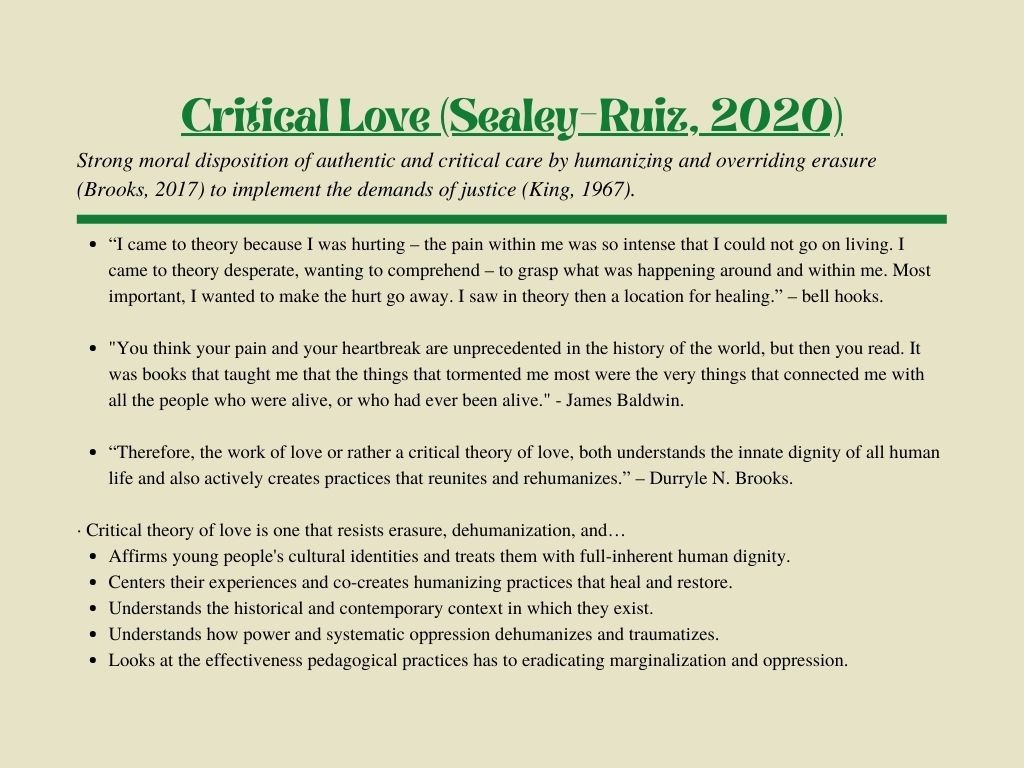
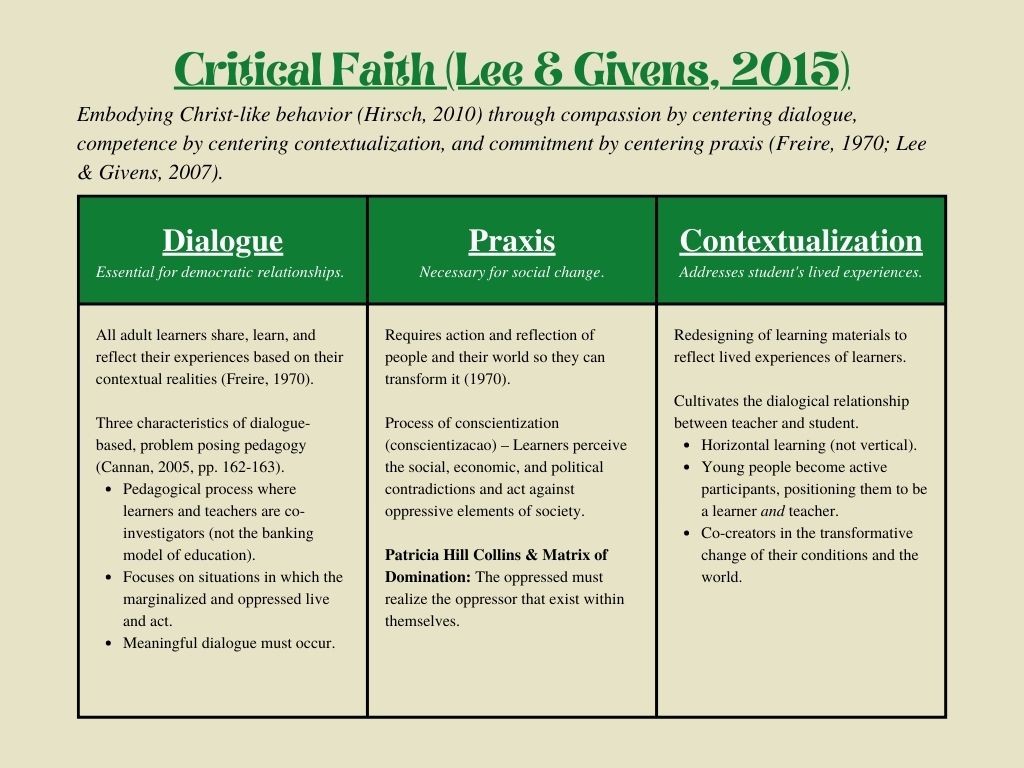
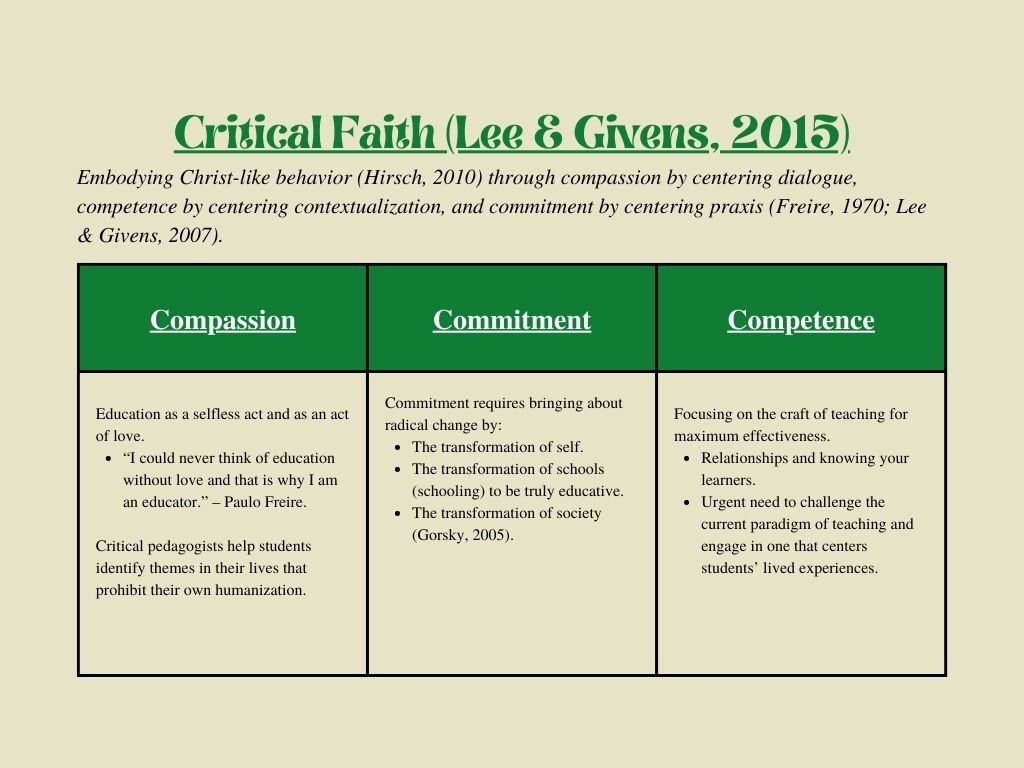


Are there any books, videos, essays or other resources that have significantly impacted your management and entrepreneurial thinking and philosophy?
Below are books and essays that have contributed greatly to my philosophy:
- Aztec Thought & Culture by Miguel Leon-Portilla.
- “Critical Care: A Color(full) Analysis of Care Narratives in the Schooling Experiences of Puerto Rican Girls” by Rosalie Rolon-Dow.
- “Critical Consciousness and the Christian Conscience: Making the Necessary Connections between Faith-Based Learning and Critical Pedagogy” by Heekap Lee & Ruth Givens.
- Cultivating Genius: An Equity Framework for Culturally and Historically Responsive Literacy by Dr. Gholdy Muhammad.
- “Culturally Relevant Pedagogy: Ingredients for Critical Teacher Reflection” by Dr. Tyrone C. Howard.
- “Education Equity Starts with Critical Love” by Dr. Yolanda Sealey-Ruiz.
- Healing Resistance: A Radically Different Response to Harm by Kazu Haga.
- Ideas – Arrangements – Effects: Systems Design and Social Justice by the Design Studio for Social Intervention.
- “Note to Educators: Hope Required When Growing Roses in Concrete” by Jeffrey M.R. Duncan-Andrade.
- Pedagogy of the Oppressed by Paulo Freire.
- “(Re)Conceptualizing Love: Moving Towards a Critical Theory of Love in Education for Social Justice” by Durryle N. Brooks.
- Solving Disproportionality and Achieving Equity: A Leader’s Guide to Using Data to Change Hearts and Minds by Dr. Edward Fergus.
- The Antonio Gramsci Reader: Selected Writings 1916-1935.
- The Fire Next Time by James Baldwin.
- The Pedagogy of the Oppressed by Paulo Freire.
- Untamed: Reactivating a Missional Form of Discipleship by Alan & Debra Hirsch.
- We Want To Do More Than Survive: Abolitionist Teaching and the Pursuit of Educational Freedom by Dr. Bettina L. Love.
- Where Do We Go From Here: Chaos or Community? by Dr. Martin Luther King Jr.
- Subtractive Schooling: U.S.-Mexican Youth and the Politics of Caring by Angela Valenzuela
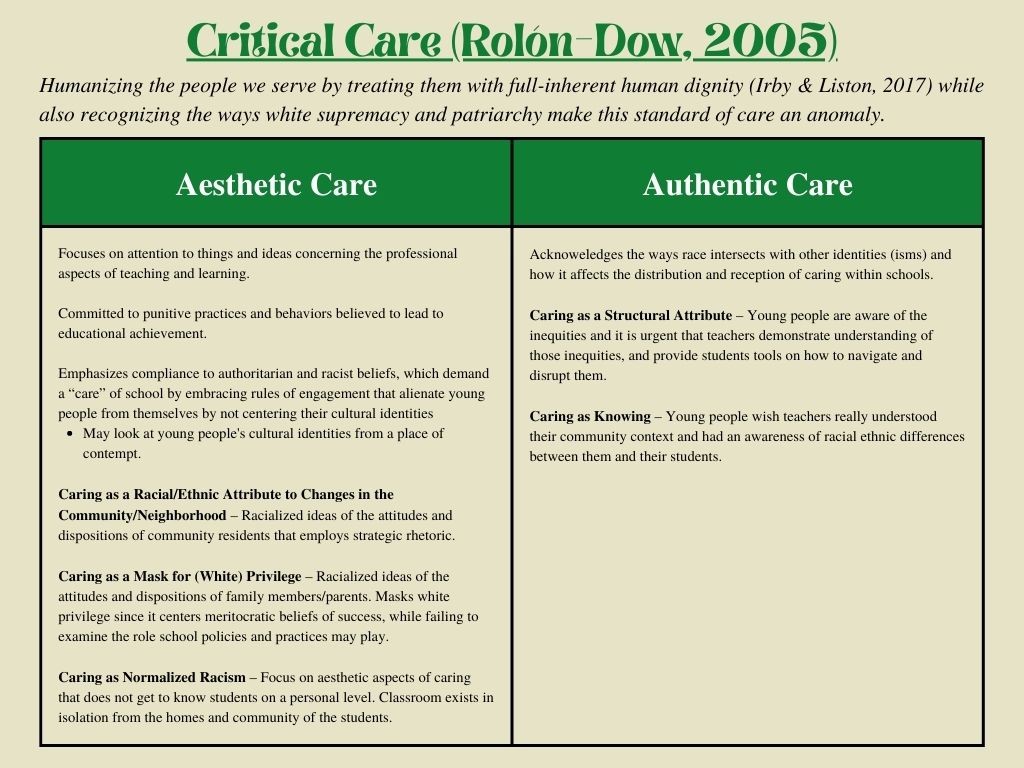
What’s a lesson you had to unlearn and what’s the backstory?
An important lesson I am still learning is that we all have our lived experiences, and I believe that that is the standpoint from which we all speak from. In addition, this is why it is important to be open to multiple perspectives because our standpoint should not be treated as an absolute truth.
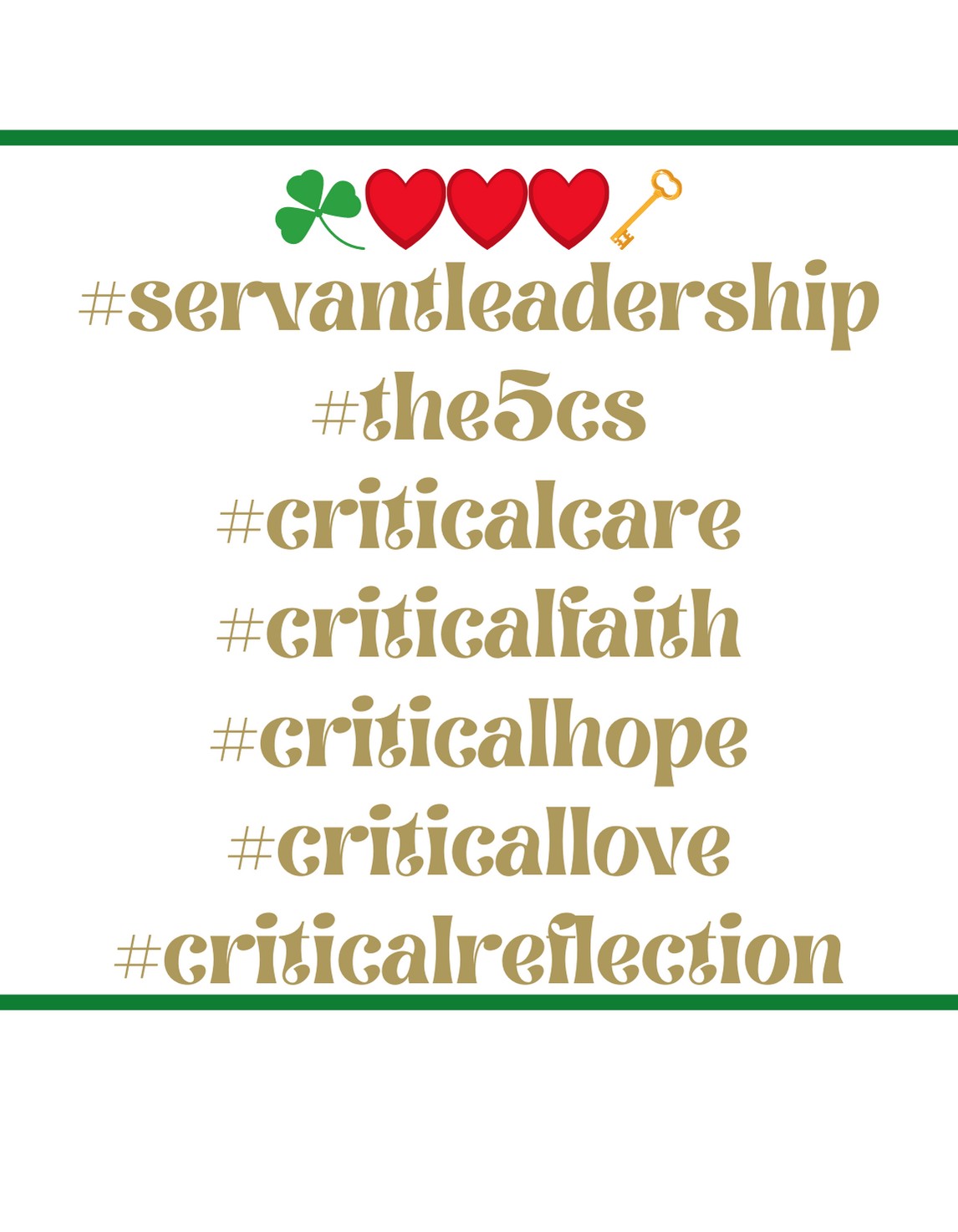
Contact Info:
- Website: https://esconsultants.weeblysite.com/
- Instagram: https://www.instagram.com/equitable_systems_consultants/
- Facebook: https://www.facebook.com/criticalkey


